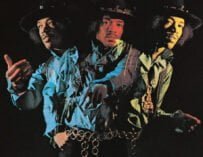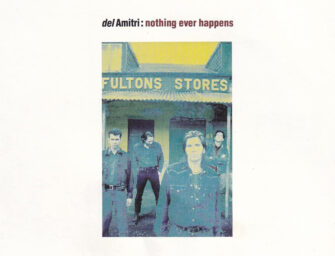
Celebrating the lyrics that gave The Sisters Of Mercy an artistic edge over a thousand and one 80s ‘goff’ outfits
On the first page of his 2002 tome The Dark Reign Of Gothic Rock – still for all its flaws the closest thing we have to an authoritative history of what has proved to be a surprisingly enduring musical and cultural phenomenon – music historian Dave Thompson says:
All that gothic rock would ever become is captured on The Sisters Of Mercy’s Reptile House EP; all that a hundred, a thousand bands have tried to recapture in their own variations was blueprinted across those five songs. It is to the Sisters’ own enduring credit that they would not be counted in that number.
Which is kind of why we’re here today. Because let’s be honest: artistically and intellectually speaking, most ‘goth’ is rubbish. Hugely enjoyable rubbish, certainly – take it from someone who spent most of the 80s clad in black and paisley, plastered in make-up and with Clairol raven hair teased to gravity-defying heights courtesy of Insette hairspray, a substance akin to vapourised tarmac that’s now officially classed as a chemical weapon by the United Nations. But rubbish nonetheless.
Artistically and intellectually speaking, The Sisters Of Mercy were/are most certainly not rubbish.
dark days begin
Born in Ely, Kent in 1959, Andrew William Harvey Taylor was supposed to follow family footsteps into the diplomatic corps; hence going to Oxford to study French and German literature, before moving to Leeds to study Mandarin Chinese. But instead of becoming a diplomat, he became a drummer, playing in various long-forgotten local bands before teaming up with a guitarist called Gary Marx.
“Because I can’t drum and sing at the same time,” he later told the fanzine Progaganda, “we bought a machine. Had we been able to buy a machine to do the singing, it might have turned out different.”
Andrew Taylor became Andrew Eldritch, ‘eldritch’ being an archaic word meaning “weird or hideous” (it crops up a lot in the novels of HP Lovecraft, though he has denied this was where he got it from – he claims it was more to do with Philip K Dick, and with there being an Andrew Taylor in Duran Duran). Eldritch, Marx and the new drum machine, christened Doktor Avalanche, became The Sisters Of Mercy, debuting with a 1980 single, Damage Done, that Eldritch has since described as “impossible to find, and equally impossible to listen to”. And lo, was a legend born.
We are not here today, however, to recount the Sisters’ long and tortuous history. As fascinating, mysterious and at times downright gruesome a tragi-comic romance as that has been, it’s a story that’s been told before. Suffice to say that few bands whose output consists of a scant three/four studio albums (depending whether you count Gift, but don’t worry about it) plus a handful of early singles have inspired such widespread devotion, or toured constantly for 30 years. That’s due to many factors: the haunting guitar lines, the incessant mechanical backbeat, the muscular, driving basslines and the virtuoso rock n’ roll stagecraft (keep ’em waiting, shroud yourselves in dry ice and they’ll lap it up) being just some that spring to mind.
But the key to really understanding the Sisters is that… you can. Understand them, that is, because where most of their many imitators’ lyrical output can best be described as ‘deep and meaningless’, Sisters song do actually – shcck! – mean something. All life is there.
between the lines
And we do mean all life. Eldritch compositions have addressed everything from failed relationships:
Frost upon these cigarettes/Lipstick on the window pane/and I’ve lost all sense of the world outside/But I can’t forget so I call your name/and I’m looking for a life for me/and I’m looking for a life for you/ and I’m talking to myself again/and it’s so damn cold it’s just not true [Nine While Nine, from First And Last And Always]
to the despair engendered by living in Thatcher’s Britain:
A people come to this/Beyond the age of reason/A people fed on famine/A people on their knees and/A people eat each other/ A people stand in line [Valentine, from the Reptile House EP]
to the joys and perils of substance abuse:
One more night spent on your mirror/black mariah in your eyes/this stuff so strange and lonely/England fades away… in your eyes [Afterhours, b-side to Body And Soul]
And from the sadness that’s inherent in watching one’s youthful co-revellers in glamour and excess settling down into conformity:
Snow on the river and two by two/Took a lot to live a lot like you/I don’t go there now but I hear they sung/Their ‘fuck me and marry me young’/Some wild idea and a big white bed/Now you know better than that, I said [Driven Like The Snow, from Floodland]
to Cold War politics:
Dreamers of sleepers and white treason/We dream of rain and the history of the gun/There’s a lighthouse in the middle of Prussia/A white house in a red square/And I’m living in films for the sake of Russia/A kino runner for the DDR [Dominion/Mother Russia, from Floodland]
By rock standards at least this is heady stuff, and a million miles from pseudo-mystical guff about kissing serpents. What’s more, like that other great leather-jacketed poet Joey Ramone before him, Eldritch knows that it takes a clever auteur to do dumb really, really well – he declared in one recent interview:
“This Corrosion is ridiculous. It’s supposed to be ridiculous. It’s a song about ridiculousness.
So I called Jim Steinman and explained that we needed something that sounded like a disco party run by the Borgias.”
That casual linking of the legendary Meatloaf producer and Renaissance politics is a signpost to another facet of Eldritch’s songs that many, perhaps, don’t get: their unashamed rock bombast is littered with sly literary, historical and artistic references, often delivered with tongue firmly in cheek. Anyone who’s read TS Eliot’s The Lovesong Of J Alfred Prufrock, for instance, will recognise the inspiration for the line in Amphetamine Logic, from 1985’s First And Last And Always:
The women come and go/talking about me like they know
And then there’s Marian (Version), from the same album. This writer was always, as a young man, troubled by the naming of this track. But why was it called ‘Version’, a tag normally reserved for dubs, remixes and such, when no other version of the song is known to exist, not even on the countless bootlegs of demos and studio out-takes that are readily available? The answer came in a late 80s interview in which Eldritch spoke of his addiction to The Times crossword. ‘Version’ is one of many words that can be used in cryptic crosswords to indicate that an anagram is required; all you need to do then is to go away and read Marina, also by Eliot, and that’s it, you’ve got the joke.
It’s this lyrical complexity, these layers of meaning, that set the Sisters apart from, say, a bunch of car mechanics from Stevenage writing songs based on the films of Sergio Leone.
no time to cry
Eldritch has likened such high-falutin’ references in his songs to hyperlinks within text, and expressed frustration at times that the general public often don’t ‘get it’. He told one Dutch fanzine that “the young people of today just don’t have the ability to review a text with any level of intelligence,” and said in a 1997 interview on the Sisters Of Mercy’s own website that:
“Things certainly seem harder than they were 20 years ago, when Dylan, Cohen and the rest could unselfconsciously refer to things which are no longer familiar to people, thereby speaking a language with a larger vocabulary, without the need to spell everything out.”
He’s also railed many times against the ‘gothic’ subculture that the Sisters at least in part inspired:
“It’s disappointing that so many people [are] in all seriousness wearing those crappy 70s clothes that we wore for a week in ’84 because we’d taken enough medication to find it funny.”
And yet for all the grumpy-old-man moaning, when he walked off-stage at the end of the Sisters’ 30th anniversary gig in Leeds last year, telling the crowd, “30 years… and I’ve have gotten away with it if it wasn’t for you pesky kids,” you got the feeling that he’s been rather enjoying himself all along.
Words: Russell Deeks


































nice read!